Childcare Partnerships: Legislations, Guidance, and Procedures
VerifiedAdded on 2020/11/12
|7
|1530
|411
Report
AI Summary
This report delves into the crucial aspects of partnership working in childcare, focusing on the legislations, guidance, and procedures that govern early years settings. It examines key legislations such as the Equity Act 2010, Childcare Act 2006, and the UN Convention on the Right of the Child 1989, highlighting their roles in ensuring equal opportunities, healthcare access, and child rights. The report also outlines guidance principles and various procedures, including safeguarding and providing equality of opportunity. Furthermore, it emphasizes the importance of collaboration among parents, practitioners, and other professionals like physicians, teachers, nurses, and social workers, to address the comprehensive needs of children. The conclusion underscores the significance of these partnerships in fostering healthy development and education, supported by a range of professional expertise, including psychiatrists, psychologists, and nutritionists. Overall, the report stresses the importance of partnerships in the child care ecosystem.
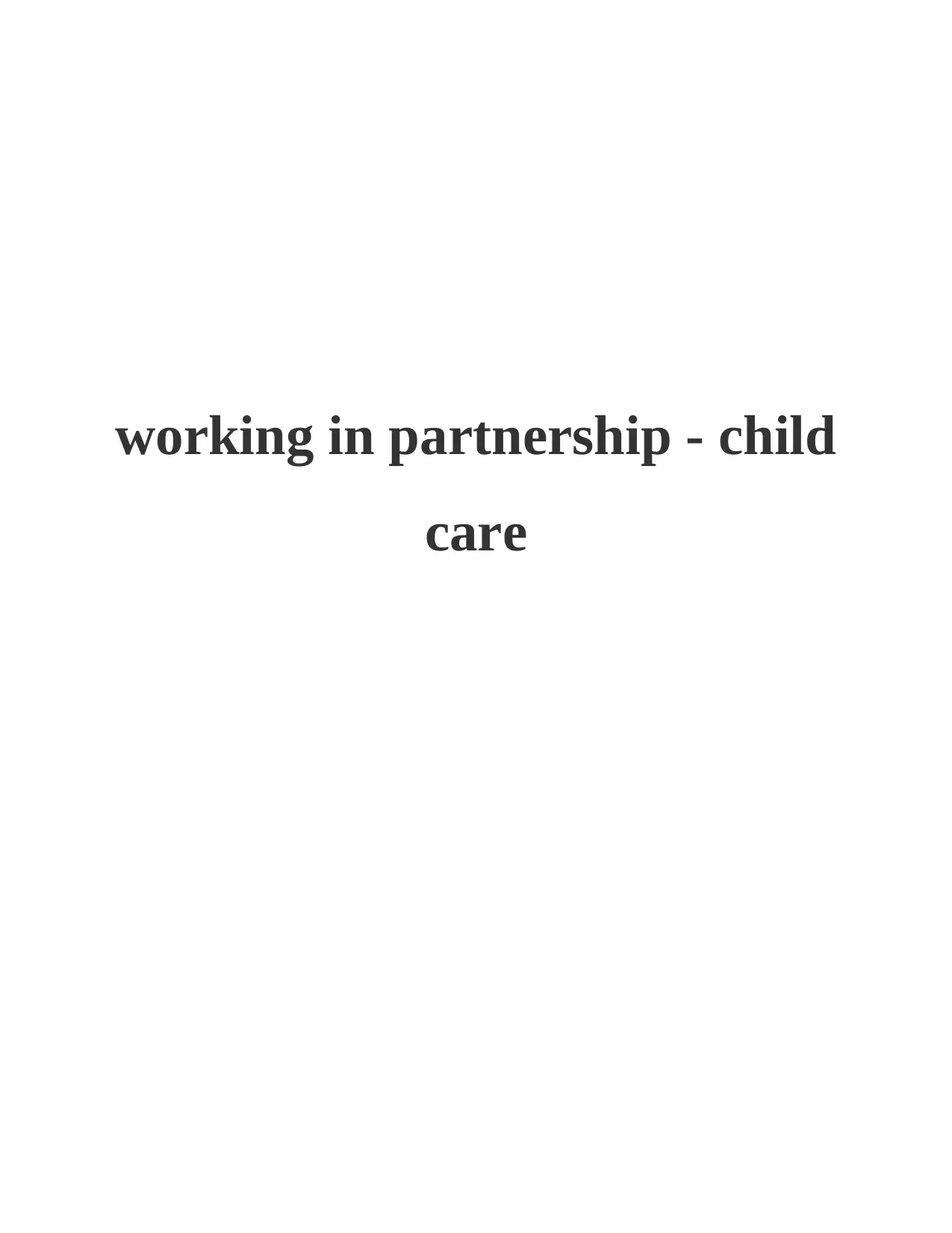
working in partnership - child
care
care
Paraphrase This Document
Need a fresh take? Get an instant paraphrase of this document with our AI Paraphraser
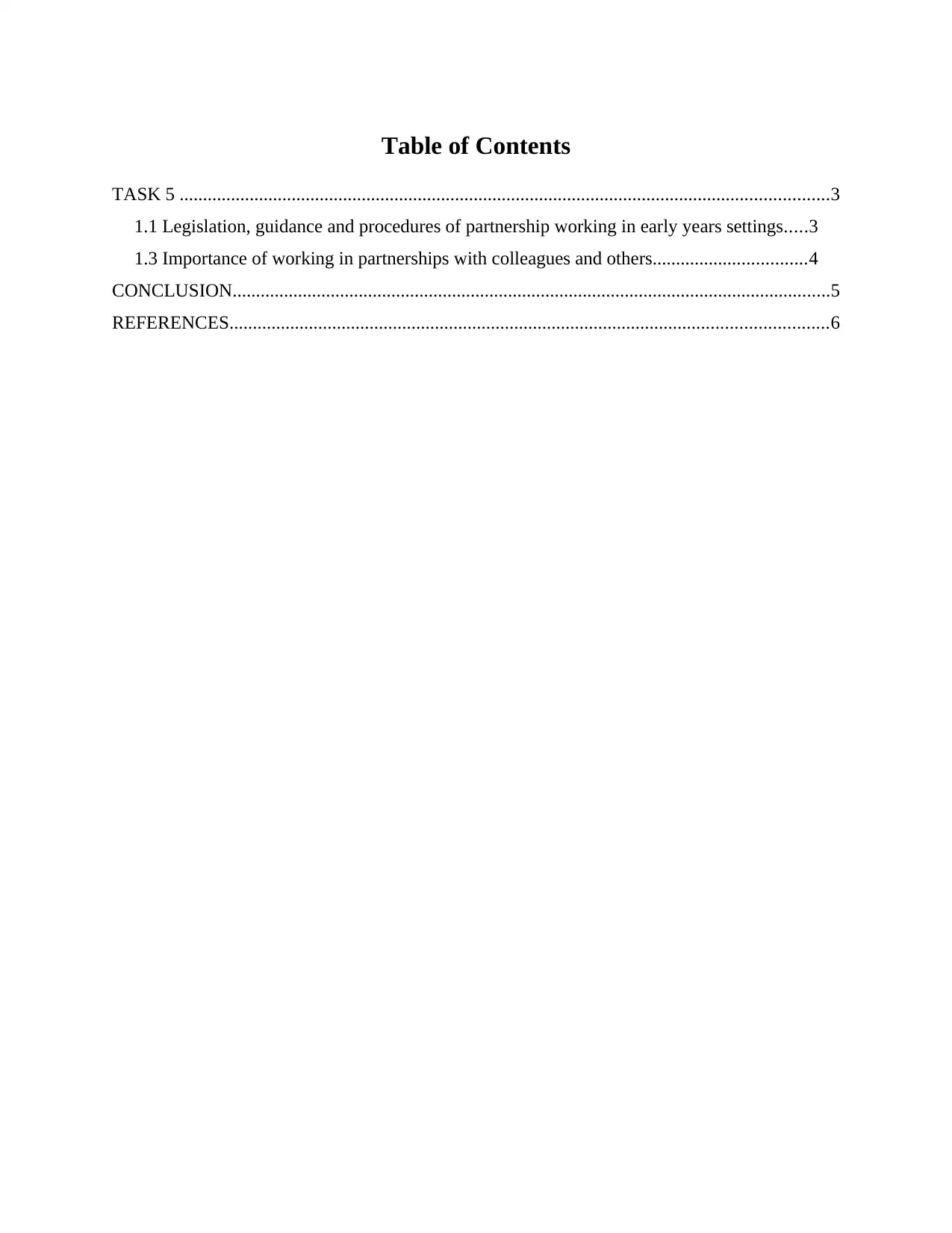
Table of Contents
TASK 5 ...........................................................................................................................................3
1.1 Legislation, guidance and procedures of partnership working in early years settings.....3
1.3 Importance of working in partnerships with colleagues and others.................................4
CONCLUSION................................................................................................................................5
REFERENCES................................................................................................................................6
TASK 5 ...........................................................................................................................................3
1.1 Legislation, guidance and procedures of partnership working in early years settings.....3
1.3 Importance of working in partnerships with colleagues and others.................................4
CONCLUSION................................................................................................................................5
REFERENCES................................................................................................................................6
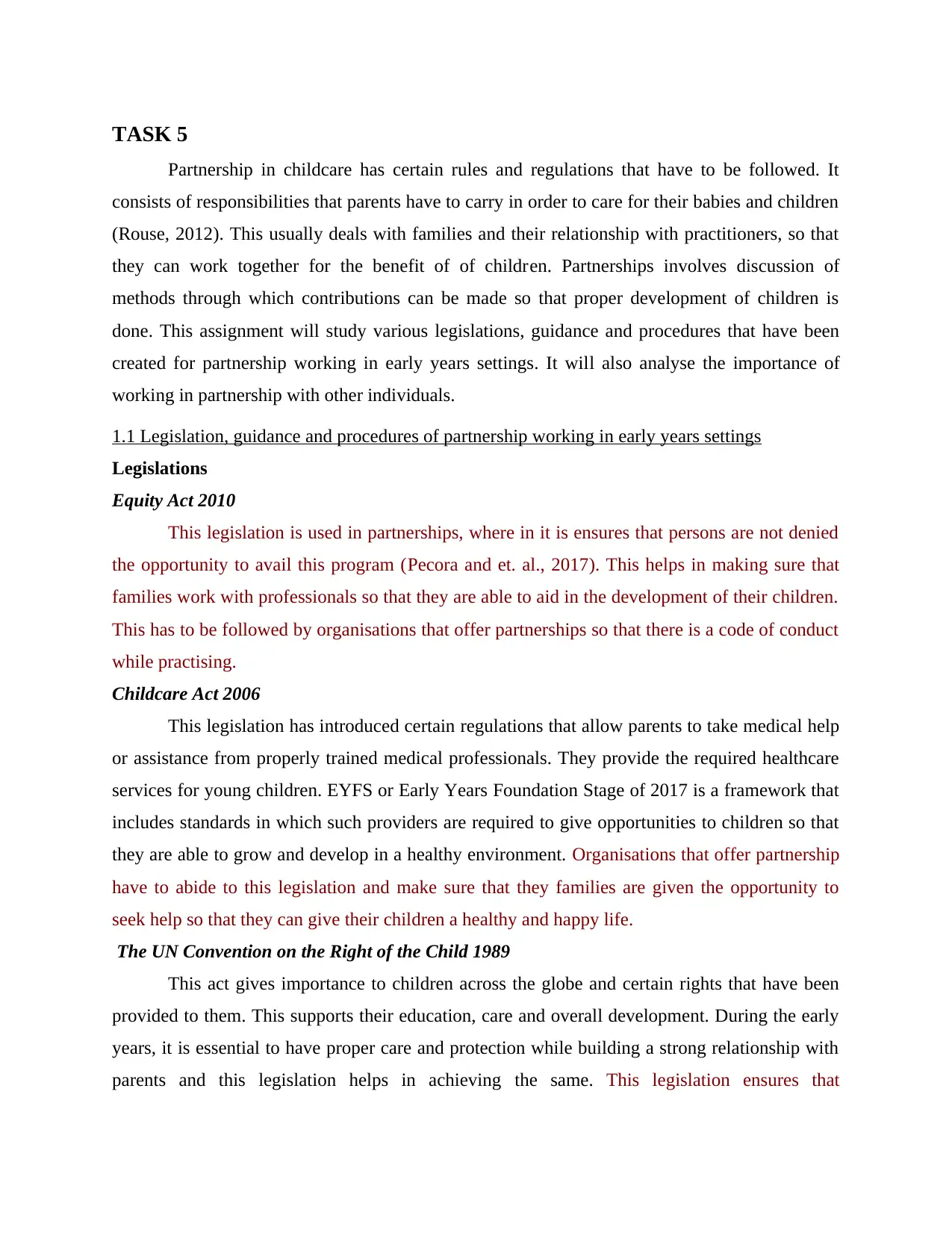
TASK 5
Partnership in childcare has certain rules and regulations that have to be followed. It
consists of responsibilities that parents have to carry in order to care for their babies and children
(Rouse, 2012). This usually deals with families and their relationship with practitioners, so that
they can work together for the benefit of of children. Partnerships involves discussion of
methods through which contributions can be made so that proper development of children is
done. This assignment will study various legislations, guidance and procedures that have been
created for partnership working in early years settings. It will also analyse the importance of
working in partnership with other individuals.
1.1 Legislation, guidance and procedures of partnership working in early years settings
Legislations
Equity Act 2010
This legislation is used in partnerships, where in it is ensures that persons are not denied
the opportunity to avail this program (Pecora and et. al., 2017). This helps in making sure that
families work with professionals so that they are able to aid in the development of their children.
This has to be followed by organisations that offer partnerships so that there is a code of conduct
while practising.
Childcare Act 2006
This legislation has introduced certain regulations that allow parents to take medical help
or assistance from properly trained medical professionals. They provide the required healthcare
services for young children. EYFS or Early Years Foundation Stage of 2017 is a framework that
includes standards in which such providers are required to give opportunities to children so that
they are able to grow and develop in a healthy environment. Organisations that offer partnership
have to abide to this legislation and make sure that they families are given the opportunity to
seek help so that they can give their children a healthy and happy life.
The UN Convention on the Right of the Child 1989
This act gives importance to children across the globe and certain rights that have been
provided to them. This supports their education, care and overall development. During the early
years, it is essential to have proper care and protection while building a strong relationship with
parents and this legislation helps in achieving the same. This legislation ensures that
Partnership in childcare has certain rules and regulations that have to be followed. It
consists of responsibilities that parents have to carry in order to care for their babies and children
(Rouse, 2012). This usually deals with families and their relationship with practitioners, so that
they can work together for the benefit of of children. Partnerships involves discussion of
methods through which contributions can be made so that proper development of children is
done. This assignment will study various legislations, guidance and procedures that have been
created for partnership working in early years settings. It will also analyse the importance of
working in partnership with other individuals.
1.1 Legislation, guidance and procedures of partnership working in early years settings
Legislations
Equity Act 2010
This legislation is used in partnerships, where in it is ensures that persons are not denied
the opportunity to avail this program (Pecora and et. al., 2017). This helps in making sure that
families work with professionals so that they are able to aid in the development of their children.
This has to be followed by organisations that offer partnerships so that there is a code of conduct
while practising.
Childcare Act 2006
This legislation has introduced certain regulations that allow parents to take medical help
or assistance from properly trained medical professionals. They provide the required healthcare
services for young children. EYFS or Early Years Foundation Stage of 2017 is a framework that
includes standards in which such providers are required to give opportunities to children so that
they are able to grow and develop in a healthy environment. Organisations that offer partnership
have to abide to this legislation and make sure that they families are given the opportunity to
seek help so that they can give their children a healthy and happy life.
The UN Convention on the Right of the Child 1989
This act gives importance to children across the globe and certain rights that have been
provided to them. This supports their education, care and overall development. During the early
years, it is essential to have proper care and protection while building a strong relationship with
parents and this legislation helps in achieving the same. This legislation ensures that
⊘ This is a preview!⊘
Do you want full access?
Subscribe today to unlock all pages.

Trusted by 1+ million students worldwide
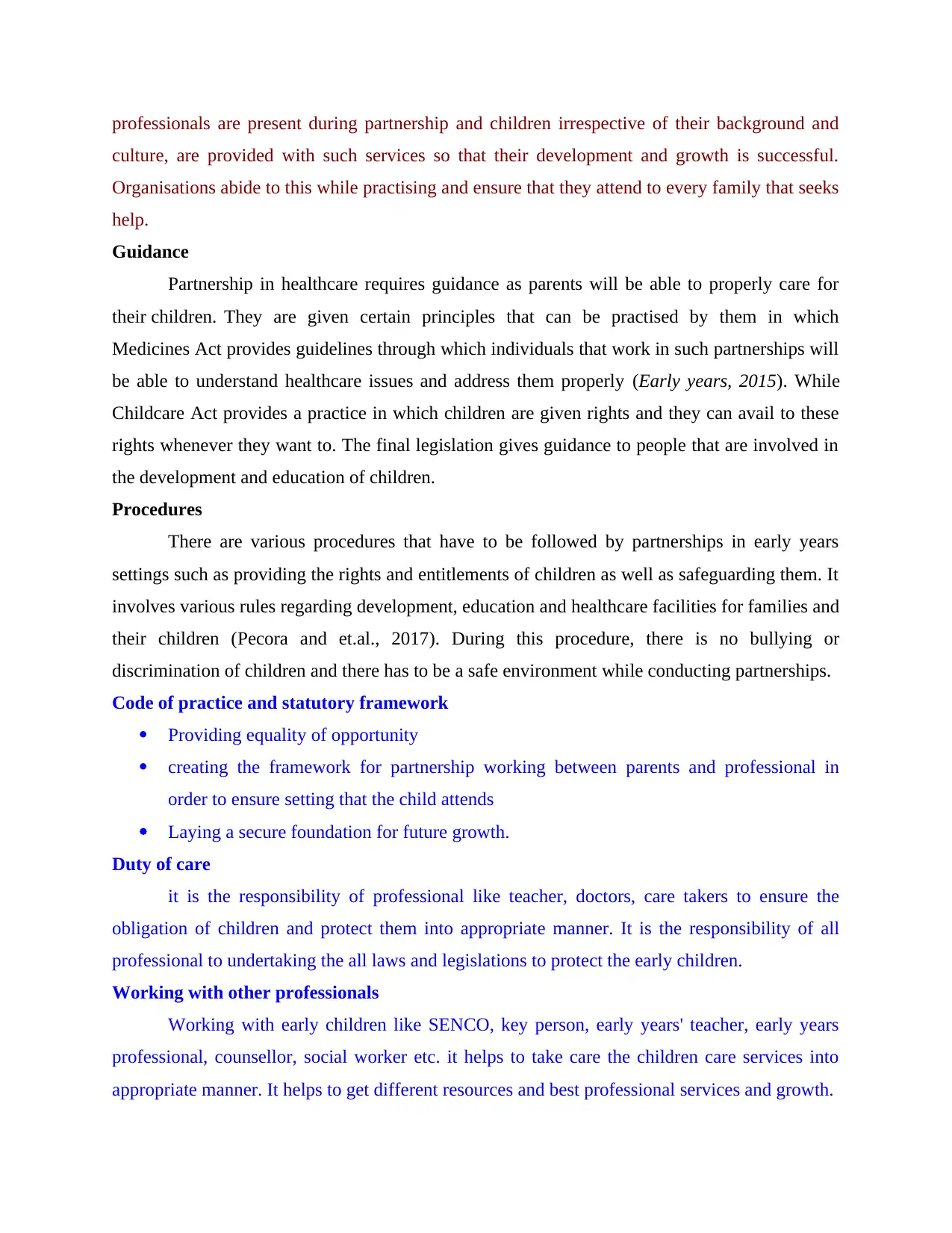
professionals are present during partnership and children irrespective of their background and
culture, are provided with such services so that their development and growth is successful.
Organisations abide to this while practising and ensure that they attend to every family that seeks
help.
Guidance
Partnership in healthcare requires guidance as parents will be able to properly care for
their children. They are given certain principles that can be practised by them in which
Medicines Act provides guidelines through which individuals that work in such partnerships will
be able to understand healthcare issues and address them properly (Early years, 2015). While
Childcare Act provides a practice in which children are given rights and they can avail to these
rights whenever they want to. The final legislation gives guidance to people that are involved in
the development and education of children.
Procedures
There are various procedures that have to be followed by partnerships in early years
settings such as providing the rights and entitlements of children as well as safeguarding them. It
involves various rules regarding development, education and healthcare facilities for families and
their children (Pecora and et.al., 2017). During this procedure, there is no bullying or
discrimination of children and there has to be a safe environment while conducting partnerships.
Code of practice and statutory framework
Providing equality of opportunity
creating the framework for partnership working between parents and professional in
order to ensure setting that the child attends
Laying a secure foundation for future growth.
Duty of care
it is the responsibility of professional like teacher, doctors, care takers to ensure the
obligation of children and protect them into appropriate manner. It is the responsibility of all
professional to undertaking the all laws and legislations to protect the early children.
Working with other professionals
Working with early children like SENCO, key person, early years' teacher, early years
professional, counsellor, social worker etc. it helps to take care the children care services into
appropriate manner. It helps to get different resources and best professional services and growth.
culture, are provided with such services so that their development and growth is successful.
Organisations abide to this while practising and ensure that they attend to every family that seeks
help.
Guidance
Partnership in healthcare requires guidance as parents will be able to properly care for
their children. They are given certain principles that can be practised by them in which
Medicines Act provides guidelines through which individuals that work in such partnerships will
be able to understand healthcare issues and address them properly (Early years, 2015). While
Childcare Act provides a practice in which children are given rights and they can avail to these
rights whenever they want to. The final legislation gives guidance to people that are involved in
the development and education of children.
Procedures
There are various procedures that have to be followed by partnerships in early years
settings such as providing the rights and entitlements of children as well as safeguarding them. It
involves various rules regarding development, education and healthcare facilities for families and
their children (Pecora and et.al., 2017). During this procedure, there is no bullying or
discrimination of children and there has to be a safe environment while conducting partnerships.
Code of practice and statutory framework
Providing equality of opportunity
creating the framework for partnership working between parents and professional in
order to ensure setting that the child attends
Laying a secure foundation for future growth.
Duty of care
it is the responsibility of professional like teacher, doctors, care takers to ensure the
obligation of children and protect them into appropriate manner. It is the responsibility of all
professional to undertaking the all laws and legislations to protect the early children.
Working with other professionals
Working with early children like SENCO, key person, early years' teacher, early years
professional, counsellor, social worker etc. it helps to take care the children care services into
appropriate manner. It helps to get different resources and best professional services and growth.
Paraphrase This Document
Need a fresh take? Get an instant paraphrase of this document with our AI Paraphraser
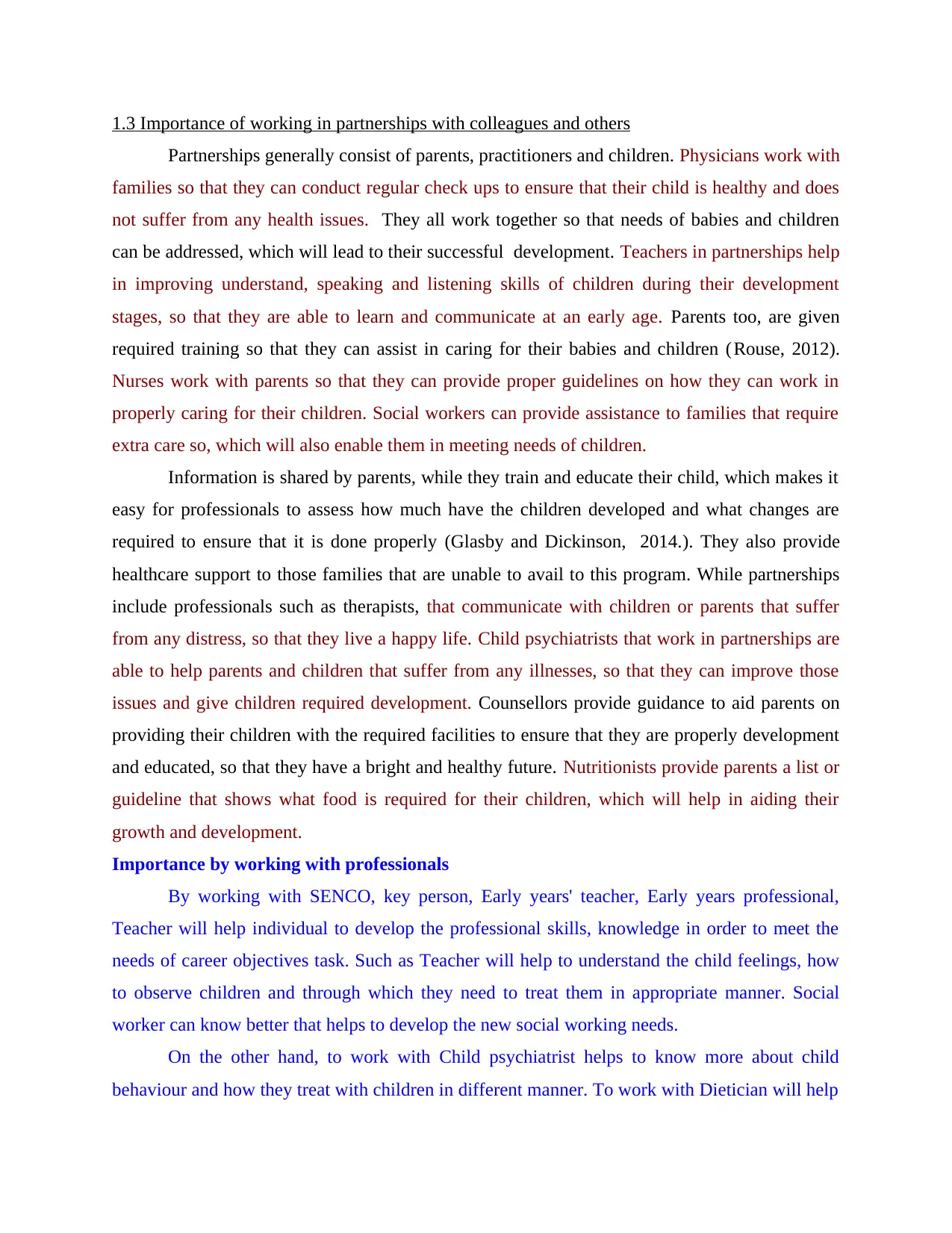
1.3 Importance of working in partnerships with colleagues and others
Partnerships generally consist of parents, practitioners and children. Physicians work with
families so that they can conduct regular check ups to ensure that their child is healthy and does
not suffer from any health issues. They all work together so that needs of babies and children
can be addressed, which will lead to their successful development. Teachers in partnerships help
in improving understand, speaking and listening skills of children during their development
stages, so that they are able to learn and communicate at an early age. Parents too, are given
required training so that they can assist in caring for their babies and children (Rouse, 2012).
Nurses work with parents so that they can provide proper guidelines on how they can work in
properly caring for their children. Social workers can provide assistance to families that require
extra care so, which will also enable them in meeting needs of children.
Information is shared by parents, while they train and educate their child, which makes it
easy for professionals to assess how much have the children developed and what changes are
required to ensure that it is done properly (Glasby and Dickinson, 2014.). They also provide
healthcare support to those families that are unable to avail to this program. While partnerships
include professionals such as therapists, that communicate with children or parents that suffer
from any distress, so that they live a happy life. Child psychiatrists that work in partnerships are
able to help parents and children that suffer from any illnesses, so that they can improve those
issues and give children required development. Counsellors provide guidance to aid parents on
providing their children with the required facilities to ensure that they are properly development
and educated, so that they have a bright and healthy future. Nutritionists provide parents a list or
guideline that shows what food is required for their children, which will help in aiding their
growth and development.
Importance by working with professionals
By working with SENCO, key person, Early years' teacher, Early years professional,
Teacher will help individual to develop the professional skills, knowledge in order to meet the
needs of career objectives task. Such as Teacher will help to understand the child feelings, how
to observe children and through which they need to treat them in appropriate manner. Social
worker can know better that helps to develop the new social working needs.
On the other hand, to work with Child psychiatrist helps to know more about child
behaviour and how they treat with children in different manner. To work with Dietician will help
Partnerships generally consist of parents, practitioners and children. Physicians work with
families so that they can conduct regular check ups to ensure that their child is healthy and does
not suffer from any health issues. They all work together so that needs of babies and children
can be addressed, which will lead to their successful development. Teachers in partnerships help
in improving understand, speaking and listening skills of children during their development
stages, so that they are able to learn and communicate at an early age. Parents too, are given
required training so that they can assist in caring for their babies and children (Rouse, 2012).
Nurses work with parents so that they can provide proper guidelines on how they can work in
properly caring for their children. Social workers can provide assistance to families that require
extra care so, which will also enable them in meeting needs of children.
Information is shared by parents, while they train and educate their child, which makes it
easy for professionals to assess how much have the children developed and what changes are
required to ensure that it is done properly (Glasby and Dickinson, 2014.). They also provide
healthcare support to those families that are unable to avail to this program. While partnerships
include professionals such as therapists, that communicate with children or parents that suffer
from any distress, so that they live a happy life. Child psychiatrists that work in partnerships are
able to help parents and children that suffer from any illnesses, so that they can improve those
issues and give children required development. Counsellors provide guidance to aid parents on
providing their children with the required facilities to ensure that they are properly development
and educated, so that they have a bright and healthy future. Nutritionists provide parents a list or
guideline that shows what food is required for their children, which will help in aiding their
growth and development.
Importance by working with professionals
By working with SENCO, key person, Early years' teacher, Early years professional,
Teacher will help individual to develop the professional skills, knowledge in order to meet the
needs of career objectives task. Such as Teacher will help to understand the child feelings, how
to observe children and through which they need to treat them in appropriate manner. Social
worker can know better that helps to develop the new social working needs.
On the other hand, to work with Child psychiatrist helps to know more about child
behaviour and how they treat with children in different manner. To work with Dietician will help
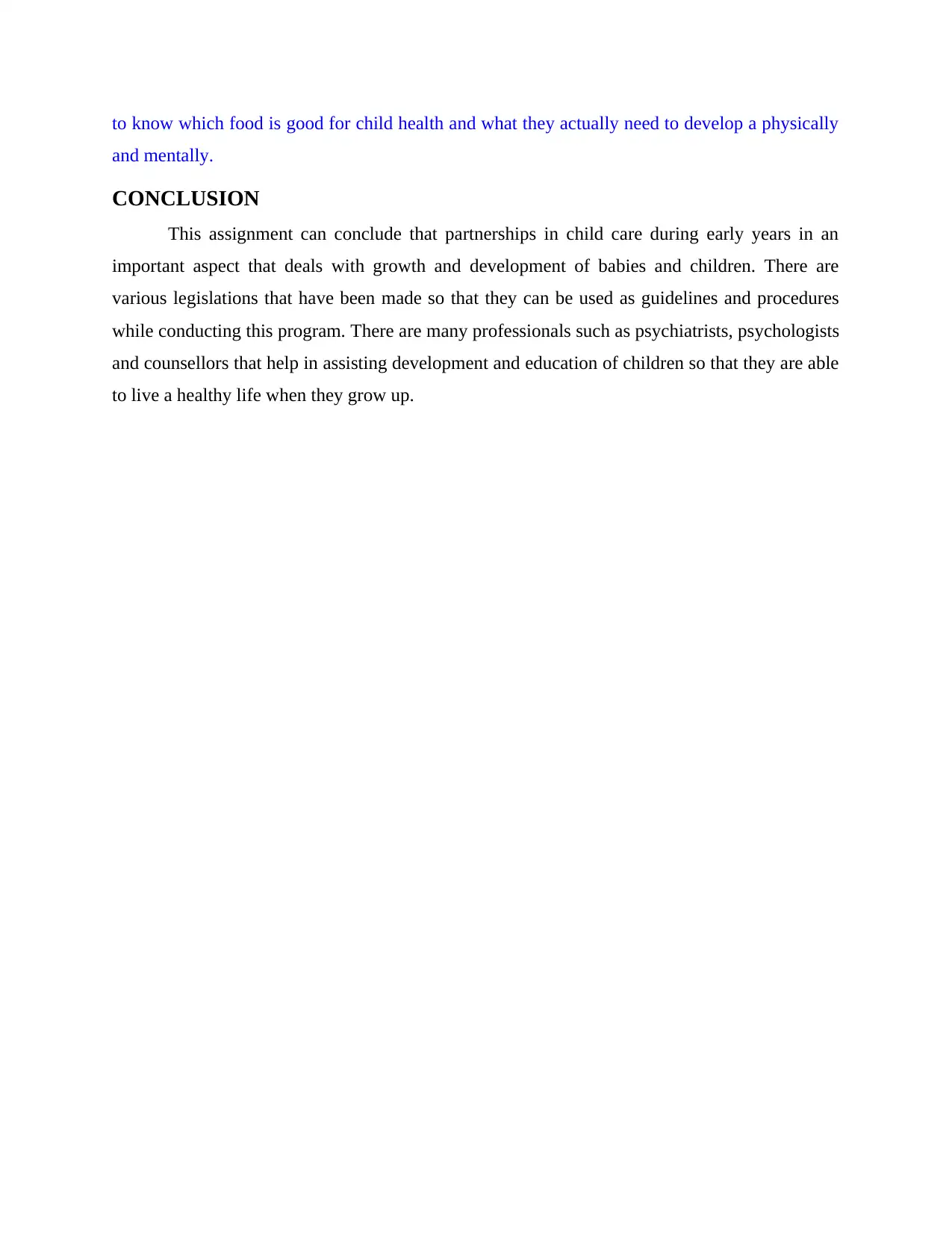
to know which food is good for child health and what they actually need to develop a physically
and mentally.
CONCLUSION
This assignment can conclude that partnerships in child care during early years in an
important aspect that deals with growth and development of babies and children. There are
various legislations that have been made so that they can be used as guidelines and procedures
while conducting this program. There are many professionals such as psychiatrists, psychologists
and counsellors that help in assisting development and education of children so that they are able
to live a healthy life when they grow up.
and mentally.
CONCLUSION
This assignment can conclude that partnerships in child care during early years in an
important aspect that deals with growth and development of babies and children. There are
various legislations that have been made so that they can be used as guidelines and procedures
while conducting this program. There are many professionals such as psychiatrists, psychologists
and counsellors that help in assisting development and education of children so that they are able
to live a healthy life when they grow up.
⊘ This is a preview!⊘
Do you want full access?
Subscribe today to unlock all pages.

Trusted by 1+ million students worldwide
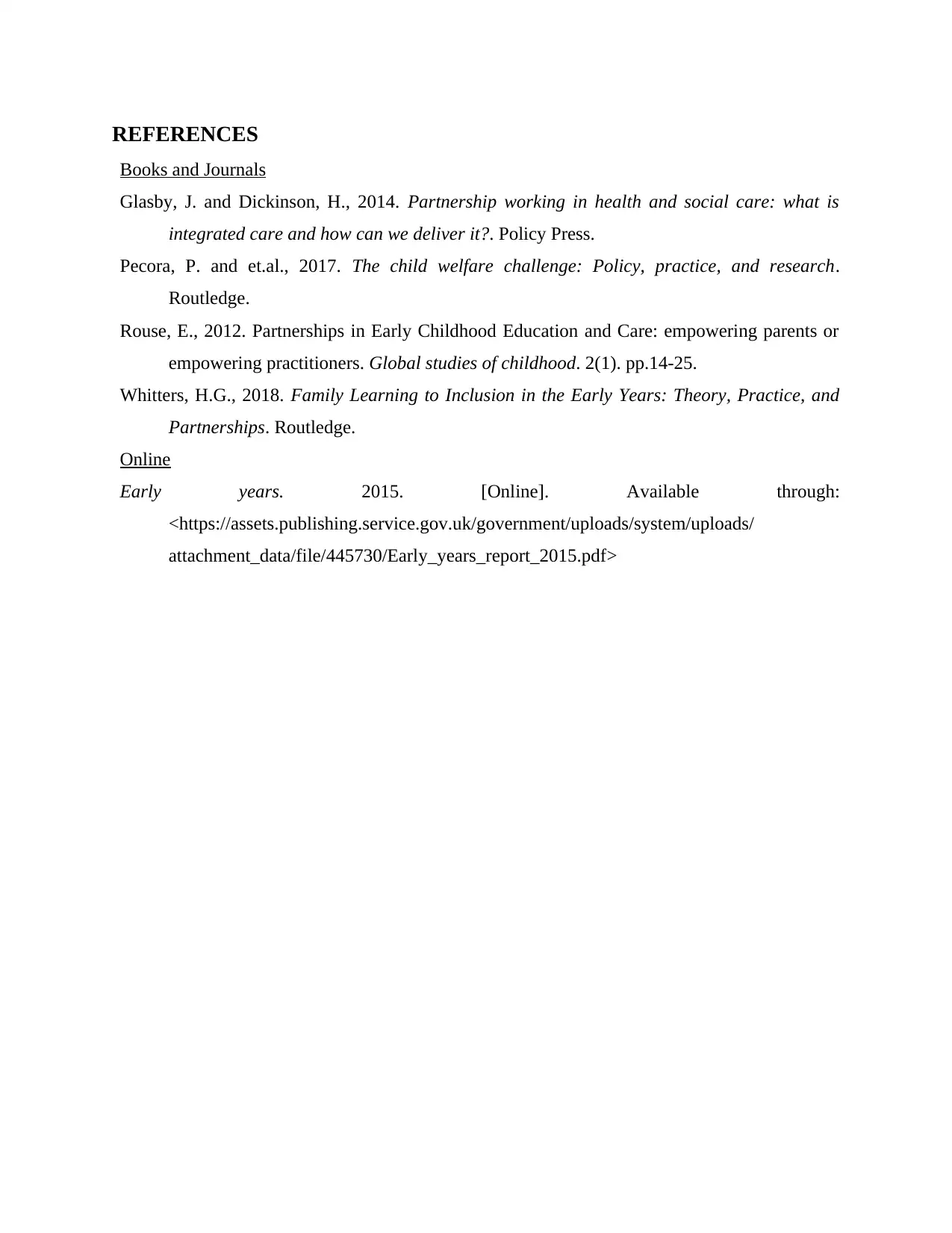
REFERENCES
Books and Journals
Glasby, J. and Dickinson, H., 2014. Partnership working in health and social care: what is
integrated care and how can we deliver it?. Policy Press.
Pecora, P. and et.al., 2017. The child welfare challenge: Policy, practice, and research.
Routledge.
Rouse, E., 2012. Partnerships in Early Childhood Education and Care: empowering parents or
empowering practitioners. Global studies of childhood. 2(1). pp.14-25.
Whitters, H.G., 2018. Family Learning to Inclusion in the Early Years: Theory, Practice, and
Partnerships. Routledge.
Online
Early years. 2015. [Online]. Available through:
<https://assets.publishing.service.gov.uk/government/uploads/system/uploads/
attachment_data/file/445730/Early_years_report_2015.pdf>
Books and Journals
Glasby, J. and Dickinson, H., 2014. Partnership working in health and social care: what is
integrated care and how can we deliver it?. Policy Press.
Pecora, P. and et.al., 2017. The child welfare challenge: Policy, practice, and research.
Routledge.
Rouse, E., 2012. Partnerships in Early Childhood Education and Care: empowering parents or
empowering practitioners. Global studies of childhood. 2(1). pp.14-25.
Whitters, H.G., 2018. Family Learning to Inclusion in the Early Years: Theory, Practice, and
Partnerships. Routledge.
Online
Early years. 2015. [Online]. Available through:
<https://assets.publishing.service.gov.uk/government/uploads/system/uploads/
attachment_data/file/445730/Early_years_report_2015.pdf>
1 out of 7
Related Documents
Your All-in-One AI-Powered Toolkit for Academic Success.
+13062052269
info@desklib.com
Available 24*7 on WhatsApp / Email
![[object Object]](/_next/static/media/star-bottom.7253800d.svg)
Unlock your academic potential
Copyright © 2020–2026 A2Z Services. All Rights Reserved. Developed and managed by ZUCOL.





